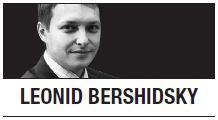There’s something disturbing about recent stories about the ideological kinship between Steve Bannon, US President Donald Trump’s chief strategist, and Marine Le Pen, the nationalist candidate running for French president. Isn’t nationalism supposed to travel badly across borders?
Isn’t international solidarity the exclusive province of leftists crying “Workers of the world, unite!”? And aren’t anti-elite nationalist populists fighting a rootless, globalist elite that has grown fat on the borderless movement of capital?
Finding the French roots of both Bannon’s and Le Pen’s ideology is a matter of connecting the dots. Bannon has reportedly expressed admiration for the ideas of Charles Maurras, an ideologist of the Nazi-collaborating Vichy regime in France who pitted the “legal state” -- embodied by governments and laws -- against a “real state” defined by the people.
Marion Marechal Le Pen, niece of Marine and one of the leading figures in the National Front party, also admired this notion in a speech to French Action -- a nationalist group of which Maurras was once a member.
Bannon has also cited a French novel, “Camp of the Saints” by Jean Raspail, of which Marine Le Pen is also a longtime fan. The 1973 novel, which is often described as racist, describes “third world” immigrants taking over Europe after Western politicians prove too weak to stop them.
“The rats won’t give up that cheese called ‘The West’ until they’ve devoured it to the very last crumb,” goes a line in the novel. “Big and thick as it is, that will take them some time.”
In turn, other European nationalist politicians owe certain ideological debts to US conservative writers. Geert Wilders, whose nativist party came in second in this month’s Dutch election, has taken inspiration from the American right. One of the first things Wilders did when trying to set up his Freedom Party was to take a trip to the US to meet some of the people whose ideas he could borrow.
The ideological cross-pollination may not be surprising at first sight -- after all, most of us don’t really care what country an idea comes from. Yet people such as Bannon, Le Pen and Wilders send a narrowly targeted, blood and soil message to voters. They promise to put their country first and everyone else second. Globalism and internationalism are dirty words to them. Unlike socialists, who easily set up international groups, the nationalists are “somewhere people” tied to a specific place. They don’t work well together.
In the European Parliament, the nationalist parties are divided between two factions: Europe of Freedom and Direct Democracy (which includes Britain’s UKIP) and Europe of Nations and Freedom (this includes Wilders’ PVV and Le Pen’s National Front). The German AfD party couldn’t pick one of these and sent its members to both. The parties don’t attend any regular gatherings together -- this year’s meeting of Wilders, Le Pen and the AfD’s Frauke Petry in Koblenz, Germany, was a rare event that may not be repeated.
The parties’ leaders cheer each other on with encouraging tweets when there’s an election; that, however, is not joint action but rather a show of hope that in their own country, things will go well for them, too.
“Because of divergent nationalist agendas, the creation of a stable and unified alliance between right-wing populist parties seems highly unlikely,” Leonid de Jonge, a Ph. D. student at Cambridge University who studies populism, wrote in a recent article about the potential for a “Brown network.”
The nationalist, populist parties, indeed, are extremely different. Wilders has nothing against gay marriage because opposing it in the Netherlands is political suicide. It’s unpopular with the French right, so Le Pen is against it. Nigel Farage, the former leader of UKIP, is openly pro-American (he even campaigned for Trump last year) while the AfD is trying to balance friendliness with a push for a smaller US presence in Germany.
The supposedly nationalist parties may be selling local traditions, local heroes, and local nostalgia to local electorates. But the common references to a literature that contrasts elites and the national interest and which warns of dangers to a white, Christian-dominated Western society make for a deeper bond, a common perception of the enemy, and a kinship that goes beyond narrow patriotism.
It is no accident that Farage has picked up an old Communist war cry about a “global revolution” that, he says, “is going to roll out across the rest of the free world.”
Globalization can’t be cheated or beaten back. The modern world’s political battles are global, or at least multinational. Paradoxically, the nationalist populist parties of today can’t achieve global success until they start openly recognizing this and forming a common agenda that is less grounded in local values than in a common ideology. For now, the centrist elites -- which have this advantage and powerful global structures -- can confine them to a few accidental local victories.
---
By Leonid Bershidsky
Leonid Bershidsky is a Bloomberg columnist. -- Ed.






